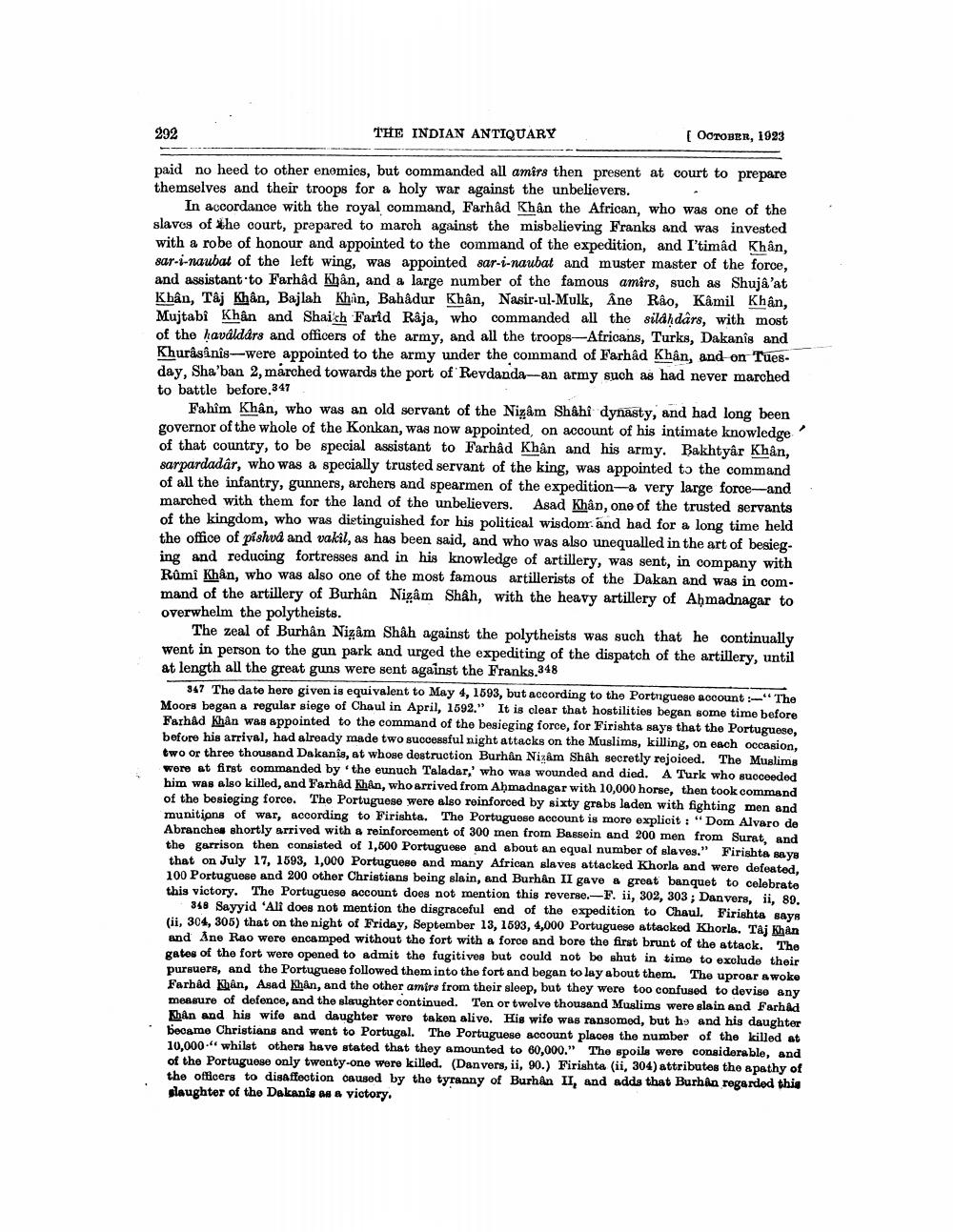________________
292
THE INDIAN ANTIQUARY
[ OCTOBER, 1923
paid no heed to other enemies, but commanded all amirs then present at court to prepare themselves and their troops for a holy war against the unbelievers.
In accordance with the royal command, Farhad Khân the African, who was one of the slaves of *he court, prepared to march against the misbelieving Franks and was invested with a robe of honour and appointed to the command of the expedition, and I'timad Khân, sar-i-naubat of the left wing, was appointed sar-i-naubat and muster master of the force, and assistant to Farhad Khân, and a large number of the famous amirs, such as Shuja'at Khân, Taj Khan, Bajlah Khan, Bahadur Khân, Nasir-ul-Mulk, Åne Rao, Kamil Khân, Mujtabi Khân and Shaish Farid Raja, who commanded all the silah dârs, with most of the kaváldárs and officers of the army, and all the troops-Africans, Turks, Dakanis and Khurasinis-were appointed to the army under the command of Farhad Khân, and on Tuesday, Sha'ban 2, marched towards the port of Reydanda--an army such as had never marched to battle before.347
Fahîm Khân, who was an old servant of the Nigam Shahi dynasty, and had long been governor of the whole of the Konkan, was now appointed, on account of his intimate knowledge of that country, to be special assistant to Farhad Khan and his army. Bakhtyâr Khân, sarpardadâr, who was a specially trusted servant of the king, was appointed to the command of all the infantry, gunners, archers and spearmen of the expedition--a very large force-and marched with them for the land of the unbelievers. Asad Khân, one of the trusted servants of the kingdom, who was dietinguished for his political wisdom and had for a long time held the office of pishud and vakil, as has been said, and who was also unequalled in the art of besieging and reducing fortresses and in his knowledge of artillery, was sent, in company with Rûmî Khân, who was also one of the most famous artillerists of the Dakan and was in com. mand of the artillery of Burhận Nizâm Shâh, with the heavy artillery of Ahmadnagar to overwhelm the polytheists.
The zeal of Burhân Nizâm Shah against the polytheists was such that he continually went in person to the gun park and urged the expediting of the dispatch of the artillery, until at length all the great guns were sent against the Franks.348
347 The date here given is equivalent to May 4, 1693, but according to the Portnguege account "The Moors began a regular siege of Chaul in April, 1592." It is clear that hostilities began some time before Farhad Khan was appointed to the command of the besieging force, for Firishta says that the Portuguese, before his arrival, had already made two successful night attacks on the Muslims, killing, on each occasion. two or three thousand Dakanis, at whose destruction Burhan Nizam Shah secretly rejoiced. The Muslims wore at first commanded by the eunuch Taladar,' who was wounded and died. A Turk who succeeded him was also killed, and Farhad Khan, who arrived from Ahmadnagar with 10,000 horse, then took command of the besioging force. The Portuguese were also reinforced by sixty grabs laden with fighting men and munitions of war, according to Firishta. The Portuguese account is more explicit : "Dom Alvaro de Abranches shortly arrived with a reinforcement of 300 men from Bassein and 200 men from Surat, and the garrison then consisted of 1,000 Portuguese and about an equal number of slaves." Firishta says that on July 17, 1693, 1,000 Portuguese and many African slaves attacked Khorla and were defeated, 100 Portuguese and 200 other Christians being slain, and Burhan II gave a great banquet to celebrate this victory. The Portuguese account does not mention this reverse.-F. ii, 302, 303 ; Danvers, ii, 89.
348 Sayyid 'All does not mention the disgraceful end of the expedition to Chaul. Firishta saya (ii, 304, 305) that on the night of Friday, September 13, 1693, 4,000 Portuguese attacked Khorla. Taj Khan and Ano Rao were encamped without the fort with a force and bore the first brunt of the attack. The gates of the fort were opened to admit the fugitives but could not be shut in time to exclude their pursuere, and the Portuguese followed them into the fort and began to lay about them. The uproar awoke Farhad Khan, Asad Khan, and the other amirs from their sleep, but they were too confused to devise any measure of defence, and the slaughter continued. Ten or twelve thousand Muslims were slain and Farhad Khan and his wife and daughter were taken alive. His wife was ransomed, but he and his daughter became Christians and went to Portugal. The Portuguese account places the number of the killed at 10,000.- whilst others have stated that they amounted to 60,000." The spoils were considerable, and of the Portuguese only twenty-one were killed. (Danvers, ii, 90.) Firishta (ii, 304) attributes the apathy of the officers to disaffection caused by the tyranny of Burhan II, and adds that Burhan regarded this slaughter of the Dekanis as a victory.




